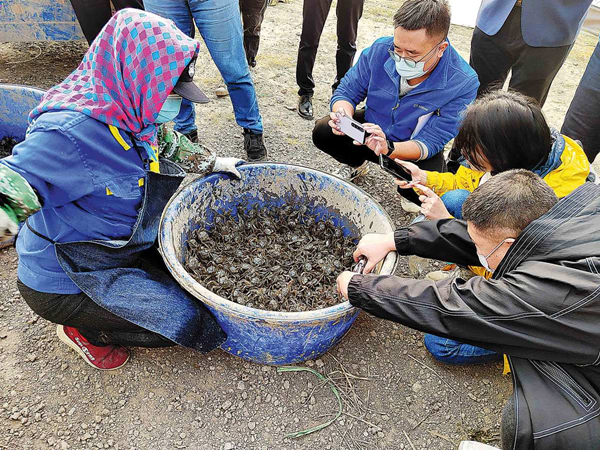
A farmer (left) shows crabs harvested from her rice paddies in Tianjin's Ninghe district. [Photo by Yang Cheng/ for China Daily]
Ninghe district in northern Tianjin has seen returning natural beauty and tranquility and increasing biodiversity as a result of its dedicated efforts to restore its ecological development.
According to statistics from the Ninghe government, its 230-square-kilometer Qilihai wetland area is now home to 160 plant species, 30 fish species and 258 bird species. In fact, the wetland's bird population has doubled during the last 10 years, thanks in part to the arrival of 76 species not previously present in the area.
It's the biggest wetland area in the Beijing-Tianjin-Tangshan triangle and not only serves as the region's lungs, but also has a major environmental impact.
A fund of 10 billion yuan($1.57 billion) has been managed since 2018 to remove illegal buildings, as well as halt all fishing, farming and agritainment businesses in the area. The total investment for the project is planned to top 17 billion yuan.
These efforts, which have come at the cost of economic development in the area, are an example to support the central government's statement that "lucid waters and lush mountains are invaluable assets", said Bai Fengxiang, Party chief of Ninghe district.
To develop the economy, the surrounding towns of the Qilihai wetland took the initiative in developing ecological agriculture and homestay businesses. The city's first national modern agricultural industrial park has been built, driving the planting of Xiaozhan rice, and the business of rice-crab polyculture in the district have proven to be very successful and welcomed by local farmers.
According to the local government, total crab sales could hit 360 million yuan this year, while rice production from polyculture could help farmers increase their incomes by 100 million yuan.
The district has also turned to green and intelligent upgrading of traditional industries and cultivating new high-tech and AI drivers. Its economic indicators have kept a leading position citywide with investments such as the northern China base of FAW-Volkswagen and the new campus of Civil Aviation University of China.
In the future, the district plans to build industrial clusters worth tens of billions in new materials, equipment manufacturing, automobiles, and light industry. It will also deepen regional coordinated development with Beijing and Hebei and attract a concentration of development elements.





